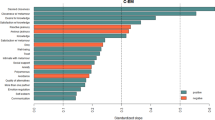Abstract
Damage to sexual self-esteem can occur readily through interactions with others; name-calling, sexual insults, unsuccessful sexual interactions, sexual victimization, and one's own impulsivity and self-destructiveness in a sexual encounter can affect the individual's sexual self-esteem. In this paper, five cases are provided to clarify the ways in which individuals experience damage to their sexual self-esteem. Some of these cases came under court scrutiny; monetary compensation was ordered by the courts because of extreme damage in some of the cases. Damage to SSE can be extreme, disabling and can significantly detract from the individual's self-view, satisfaction with life, capability to experience pleasure, willingness to interact with others and ability to develop relationships.
Similar content being viewed by others
REFERENCES
Anderson, B. L. and Cyranowski, J. M. “Women's Sexual Self-schema.” Journal of Personality and Social Psychology, 1994;67:1079-1100.
Bigler, M. O. “Childhood Sexual Trauma as a Predictor of Adult Sexual Self-Esteem.” Dissertation Abstracts International, 1993; Sept. Vol 54 (9-B) 1326.
Zeanah, P. D. The Development of a Measure of Female Sexual Self-Esteem, Dissertation Abstracts International, 1993, May, Vol 53 (11-b), 6002-6003.
Ragland, E. K. “Social and Sexual Self-esteem in Women and Perceived Father-Daughter Relationships During Early Adolescence.” Dissertation Abstracts International, March, Vol 38 (9-A) 5365.
Rosenthal, D., Moore, S. and Flynn, I. “Adolescent Self Efficacy, Self-esteem and Sexual Risk-Taking.” Special Issue: Social Dimensions of AIDS. Journal of Community and Applied Social Psychology, 1991;1:77-88.
Cole, F. “The Role of Self-esteem in Safer Sexual Practices.” Journal of the Association of Nurses in AIDS Care, 1997;8(6);64-70.
Meyer, B. “Sex and the Slimming Woman.” Weight Watchers Magazine, 1994;27(2):36-41.
Saxton, M. “Reclaiming Sexual Self-esteem—Peer Counseling for Disabled Women.” The Western Journal of Medicine, 1991;154(5):630-632.
Mayers, K.S. and Heller, J.A. “Sexuality and the Late Stage Huntington's Disease Patient.” Sexuality and Disability, 2003;21(2):91-105.
Mayers, K. S. and McBride, D.C. “Sexualized Components of Verbally Abusive Statements by Residents with Dementia Diagnoses.” Sexuality and Disability, 1996;14(2):109-116.
Author information
Authors and Affiliations
Rights and permissions
About this article
Cite this article
Mayers, K.S., Heller, D.K. & Heller, J.A. Damaged Sexual Self-Esteem: A Kind of Disability. Sexuality and Disability 21, 269–282 (2003). https://doi.org/10.1023/B:SEDI.0000010069.08844.04
Issue Date:
DOI: https://doi.org/10.1023/B:SEDI.0000010069.08844.04



